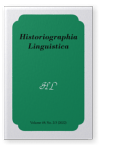Kristoffer Friis Bøegh
List of John Benjamins publications for which Kristoffer Friis Bøegh plays a role.
2022 The Beginning of Quantitative Sociolinguistics in the Nineteenth Century: The Dane Anker Jensen (1878–1937) and his pioneering study “The Linguistic Situation in the Parish of Aaby, Aarhus County” (1898) Historiographia Linguistica 49:2/3, pp. 336–354 | Article
In 1898, a young Dane, Anker Jensen (1878–1937), published a pioneering study in which he investigated the linguistic situation in Aaby, then a village and parish located just west of Aarhus (the second-largest city of Denmark, in Jutland), and today an integrated part of the city. Anker… read more
2022 The Linguistic Situation in the Parish of Aaby, Aarhus County Historiographia Linguistica 49:2/3, pp. 355–371 | Translation
2017 Chapter 7. West African languages and creoles worldwide Creole Studies – Phylogenetic Approaches, Bakker, Peter, Finn Borchsenius, Carsten Levisen and Eeva M. Sippola (eds.), pp. 141–174 | Chapter
In creole studies, there has been a long tradition of discussing the respective contributions of African languages in the genesis of creoles spoken primarily in the Atlantic and the Indian Oceans. Creolists have often assumed that the African languages that contributed to the creation of creoles… read more
2017 Chapter 13. Cognitive creolistics and semantic primes: A phylogenetic network analysis Creole Studies – Phylogenetic Approaches, Bakker, Peter, Finn Borchsenius, Carsten Levisen and Eeva M. Sippola (eds.), pp. 293–313 | Chapter
This study presents a semantics-driven lexical comparison of 20 creole languages and five European lexifier languages. Breaking new ground into understanding creole semantics, it utilizes insights from both cognitive semantics (in particular, the Natural Semantic Metalanguage approach) and… read more
“Mij dodte, mij loppe, in mijn lande”: Extending the horizon on documented contact language use in the Virgin Islands with a quote in incipient Dutch Creole from 1681 Journal of Pidgin and Creole Languages: Online-First Articles | Article
A 1681 letter written by Jørgen Iversen (1638–1682), the first governor of Danish St. Thomas, unearthed from the Danish National Archives, contains a quote in incipient Virgin Islands Dutch Creole (VIDC). The quote, Mij dodte, mij loppe, in mijn lande, lit. ‘I die/dead, I go, in my country’… read more

